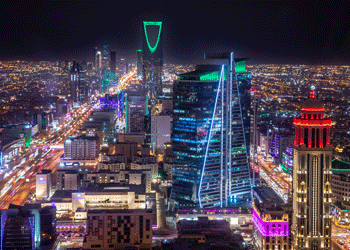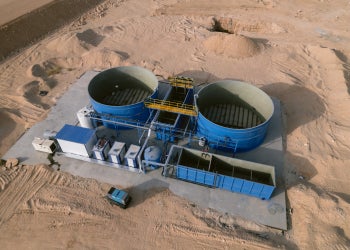AI accelerates UAE power generation projects sector
10 April 2025

On 3 April, Abu Dhabi National Energy Company (Taqa) and Emirates Water & Electricity Company (Ewec) confirmed for the first time the UAE capital’s energy infrastructure plans to support its artificial intelligence (AI) and net-zero strategies.
The programme will require an investment of AED36bn ($9.8bn), comprising the round-the-clock 5.2GW solar plus 19 gigawatt-hour battery energy storage system (bess) plants announced in January; a 1GW open-cycle gas turbine plant in Dhafra, which Taqa will own, finance and operate; and advanced grid infrastructure.
This development followed several months of speculations concerning the UAE capital’s plans for a power generation portfolio and infrastructure projects supporting its AI strategy.
It came on the heels of the Abu Dhabi government announcing plans to embark on a three-year digital strategy, requiring the deployment of AED13bn in investment, to make it the “first government globally” to fully integrate AI into its digital services by 2027.
The Abu Dhabi Digital 2025-27 Strategy aims to 100% adopt sovereign cloud computing for government operations and digitise and automate 100% of processes “to streamline procedures, enhance productivity and improve operational efficiency”.
“One thing that strikes me about this Ewec and Taqa announcement is the question of how much of a model it can be for enabling solar with additional gas power, which should be what happens in other countries like in the US,” Karen Young, senior research scholar at Columbia University’s Centre on Global Energy Policy, tells MEED.
Young acknowledges that the ability to scale up with state-owned assets and offtake agreements gives the UAE a capacity that other markets will find difficult to replicate.
“It is certainly an advantage and one reason why the UAE is ahead of other regional markets, including Saudi Arabia, but also on a global scale,” she explains.
Staging an aggressive and energy-intensive AI programme while complying with its net-zero aspirations will keep the UAE’s utility stakeholders on their toes over the coming few years.
Robust capacity buildout
In addition to these three major project blocks, separate thermal, renewable energy and battery energy storage projects are in various construction and procurement stages in Abu Dhabi and Dubai.
Somewhat ironically and similar to Saudi Arabia, the UAE’s main utility stakeholders have stepped into what could be their busiest year in terms of capacity buildout, in order to meet their mid-term 2030 energy diversification targets while supporting the government’s industrial and economic expansion programmes.
According to MEED Projects data, the UAE power sector let an estimated $5.2bn-worth of contracts in 2024, up 70% from the previous full year.
Last year, the UAE awarded four generation contracts representing the full spectrum of fuel, except nuclear. These were the 1.5GW Al-Ajban solar independent power project (IPP), the Dhafra waste-to-energy project, the Ruwais cogeneration and utility package in Abu Dhabi, and the contract to complete the third phase of the Jebel Ali K power station in Dubai.
Expectations that Abu Dhabi Future Energy Company (Masdar) will sign the engineering, procurement and construction (EPC) contracts for the estimated $6bn round-the-clock solar plus battery facility this year, in addition to the 1GW Dhafra open-cycle gas turbine (OCGT) project, for which a contract was already awarded in April, guarantee that contract awards in the UAE’s power projects sector will further accelerate.
Upcoming projects
According to MEED Projects data, as of early April, an estimated $7.2bn-worth of generation and $1bn of transmission and distribution contracts were in the bid and bid evaluation stages across the UAE.
These include six major generation projects in Abu Dhabi that are expected to be awarded this year. These are the 2.5GW Taweelah C combined-cycle gas turbine scheme, Madinat Zayed OCGT IPP, Al-Khazna and Al-Zarraf solar photovoltaic (PV), Al-Sila wind and Bess 1.
The prequalification proceedings are under way for generation projects worth $7.2bn and transmission projects worth $180m.
The 3.3GW Al-Nouf combined-cycle gas turbine (CCGT) scheme in Abu Dhabi and phase seven of Dubai’s Mohammed Bin Rashid Solar Park are the main projects in the prequalification stage.
Last year, there were indications that Abu Dhabi could start initiating the procurement process for the next phase of the Barakah nuclear power plant this year. However, more recent developments indicate that this process could be delayed by a year or two, depending on multiple factors, including demand growth and costs.
Including the next phase of Barakah in the upcoming projects pipeline takes the estimated total value of planned and unawarded generation projects in the UAE to roughly $47bn.
Battery
The deployment of substantial battery energy storage capacity is crucial in ensuring grid flexibility as the UAE’s electricity grids take on an increasing amount of renewable power.
Ewec received two bids for the contract to develop Bess 1, which will be built in two locations with a total capacity of 400MW.
The project will closely follow Abu Dhabi’s IPP model, in which developers enter into a long-term energy storage agreement with Ewec as the sole procurer.
The first plant will be in Al-Bihouth, about 45 kilometres (km) southwest of Abu Dhabi, and the second plant will be in Madinat Zayed, about 160km southwest of the city.
According to industry sources, the companies that submitted bids for the contract in March include:
- EDF Renewables (France)
- Engie (France) / Saudi Electricity Company (SEC, Saudi Arabia) / Hajj Abdullah Alireza Company (Haaco, Saudi Arabia)
- Jinko Power (China) / Alghanim International (Kuwait)
In Dubai, the prequalification process is under way for the seventh phase of the MBR Solar Park, which will include a solar PV plant with a capacity of 1.6GW and a 1GW bess plant intended to produce six hours of storage capacity.
The $6bn round-the-clock solar plus bess project in Abu Dhabi boasts 19GWh of battery storage capacity, which is envisaged to enable renewable power to be dispatched similar to a baseload capacity, which gas or nuclear plants typically supply.
Fittingly, the UAE’s Minister of Industry and Advanced Technology Sultan Al-Jaber described the project as Abu Dhabi’s response to the “moonshot challenge of our time”, which is the intermittency of renewables.
Masdar has already selected the preferred EPC, solar PV and battery technology subcontractors for the project.
India’s Larsen & Toubro and Beijing-headquartered PowerChina will undertake the project’s EPC contracts, while Shanghai-based Jinko Solar and Beijing-headquartered JA Solar will supply solar PV modules.
Another Chinese firm, Fujian-based Contemporary Amperex Technology Company), will supply its Tener product line for the bess plant.
The project will be structured as a classic public-private partnership (PPP), funded by equity and syndicated debt.
It is being deployed on a fast-track basis, with financial close expected by the second quarter of this year and commercial operations set for 2027.
Exclusive from Meed
-
 Solar deals signal Saudi Arabia’s energy ambitions
Solar deals signal Saudi Arabia’s energy ambitions13 February 2026
-
 Saudi Arabia appoints new investment minister
Saudi Arabia appoints new investment minister13 February 2026
-
 Indian firm wins major Oman substation contract
Indian firm wins major Oman substation contract12 February 2026
-
 Developers appoint contractor for $500m wastewater treatment project
Developers appoint contractor for $500m wastewater treatment project12 February 2026
-
 Dewa raises Empower stake in $1.41bn deal
Dewa raises Empower stake in $1.41bn deal12 February 2026
All of this is only 1% of what MEED.com has to offer
Subscribe now and unlock all the 153,671 articles on MEED.com
- All the latest news, data, and market intelligence across MENA at your fingerprints
- First-hand updates and inside information on projects, clients and competitors that matter to you
- 20 years' archive of information, data, and news for you to access at your convenience
- Strategize to succeed and minimise risks with timely analysis of current and future market trends

Related Articles
-
 Solar deals signal Saudi Arabia’s energy ambitions
Solar deals signal Saudi Arabia’s energy ambitions13 February 2026
 Commentary
Commentary
Mark Dowdall
Power & water editorSaudi Arabia’s recent agreement to build $2bn-worth of solar power plants in Turkiye is the latest sign that the kingdom’s energy influence is changing.
Historically, this was measured in oil barrels and export volumes. Increasingly, this is extending to capital, structuring expertise and the ability to deliver record-low tariffs in competitive markets.
Announcing the deal, Turkish Energy Minister Alparslan Bayraktar said tariffs for the plants would be the country’s lowest on record, with electricity purchased under 25-year power purchase agreements.
It followed another announcement, in January, that Acwa is investing $200m to build a large-scale solar photovoltaic (PV) plant in the Philippines.
Whether Saudi-backed companies ultimately retain long-term stakes or primarily develop and build the assets, their role at the front end is significant.
Sponsors that bring sovereign backing, clear procurement processes and access to low-cost financing can influence tariffs and contract terms from the outset.
There is also a geopolitical layer. Investing in Turkiye, or anywhere for that matter, strengthens political and economic ties at a time when regional alignments are shifting.
Energy infrastructure is also long-term by its nature. It connects ministries, regulators, lenders and operators in relationships that often extend well beyond a single transaction.
Saudi Arabia has spent the past few years refining its approach to pricing, structuring and financing large-scale renewables at home.
Exporting that expertise may not rival oil in scale or visibility, but it does signal that Saudi Arabia is becoming more than just an energy supplier.
Increasingly, it is becoming a participant in how other countries design and finance their energy transitions. That influence is still significant.
https://image.digitalinsightresearch.in/uploads/NewsArticle/15645903/main.jpg -
 Saudi Arabia appoints new investment minister
Saudi Arabia appoints new investment minister13 February 2026
Register for MEED’s 14-day trial access
King Salman Bin Abdulaziz Al-Saud has made a series of senior government changes, including Khalid Al-Falih leaving his role as investment minister to become minister of state and a member of the cabinet.
Al-Falih has been replaced by Fahad Al-Saif as investment minister. Al-Saif has been head of the Investment Strategy and Economic Insights Division at the Public Investment Fund (PIF) since 2024. That role involved formulating PIF’s long-term investment strategy. He has also served as head of the Global Capital Finance Division, a role he has held since joining PIF in 2021.
The change of investment minister comes at a time when securing investments has become a key priority for Saudi Arabia as it prepares to hand over more projects to the private sector for delivery.
King Salman also named Abdullah Al-Maghlouth as vice-minister of media and Abdulmohsen Al-Mazyad as vice-minister of tourism. Khalid Al-Yousef was named attorney general, and Sheikh Ali Al-Ahaideb will serve as president of the Board of Grievances.
Faihan Al-Sahli was selected as director general of the General Directorate of Investigation, while Abdulaziz Al-Arifi was chosen to lead the National Development Fund. Haytham Al-Ohali will head the Communications, Space and Technology Commission, and Fawaz Al-Sahli will chair the Transport General Authority.
https://image.digitalinsightresearch.in/uploads/NewsArticle/15645415/main.gif -
 Indian firm wins major Oman substation contract
Indian firm wins major Oman substation contract12 February 2026

India’s Larsen & Toubro has won a contract to build the Majan 400/220/132kV grid station in Oman.
Estimated to cost $100m, the project includes an associated 400kV line-in line-out underground cable from Sohar Free Zone to the Sohar Interconnector Station.
The contract was awarded by Oman Electricity Transmission Company (OETC), part of the government-owned Nama Group.
The grid station will comprise eight 400kV gas-insulated switchgear (GIS) bays, eight 220kV GIS bays and 10 132kV GIS bays at the new Sohar Free Zone substation.
The scope includes the installation of two 500MVA, 400/220kV transformers and two 500MVA, 220/132kV transformers.
Local firm Monenco Consulting Engineers was appointed in April last year to provide design and supervision services for the project.
As MEED exclusively revealed, the main contract was tendered in June, as part of three significant contracts to build new substations in the sultanate.
The second contract, worth about $35m, covers the construction of the Sultan Haitham City 132/33kV grid station and associated 132kV line-in line-out underground cables running 4 kilometres from Mabella to Mabella Industrial Zone.
The third contract, valued at about $100m, covers the construction of the Surab 400/33kV grid station and an associated 400kV line-in line-out cable from the Duqm grid station to the Mahout grid station.
Local firms Muscat Engineering Consulting and Hamed Engineering Services are consultants for the Sultan Haitham City and Surab projects, respectively.
The two remaining contracts are currently under bid evaluation, with awards expected this quarter.
https://image.digitalinsightresearch.in/uploads/NewsArticle/15638107/main.jpg -
 Developers appoint contractor for $500m wastewater treatment project
Developers appoint contractor for $500m wastewater treatment project12 February 2026

Register for MEED’s 14-day trial access
Egypt’s Orascom Construction has won the engineering, procurement and construction (EPC) contract for a major wastewater treatment project in Saudi Arabia’s Eastern Province.
A consortium of Saudi utilities provider Marafiq, the regional business of France’s Veolia and Bahrain/Saudi Arabia-based Lamar Holding is developing the $500m (SR1.875bn) industrial wastewater treatment plant (IWWTP) in Jubail Industrial City 2.
Sources close to the project confirmed the appointment to MEED, adding that the project has now entered the construction phase.
Industry sources also said that financial close on the project is expected to be reached in the coming days.
In September, the developer consortium was awarded a contract, under a 30-year concession agreement, by Saudi Aramco Total Refining & Petrochemical Company (Satorp), a joint venture of Saudi Aramco and France’s TotalEnergies.
The planned facility will treat and recycle wastewater from Satorp’s under-construction Amiral chemical derivatives complex, also in Jubail.
Marafiq, formally Power & Water Utility Company for Jubail and Yanbu, will own a 40% stake in the dedicated project company. Veolia Middle East SAS will hold a 35% stake, and Lamar Holding’s Lamar Arabia for Energy will hold the other 25%.
The planned IWWTP, which will primarily serve the $11bn sprawling Amiral chemicals zone, will implement advanced water treatment and recovery technologies to process complex industrial effluents, including spent caustic streams. Treated water will be reintegrated into the industrial processes, supporting closed-loop reuse and energy efficiency.
The project follows a concession-style model, akin to a public-private partnership (PPP), where the developer consortium invests in, builds and operates the wastewater plant over a 30-year period, with returns linked to service delivery.
Marafiq has been involved in several similar projects across Saudi Arabia, including as the sole owner of the Jubail industrial water treatment plant (IWTP8), which treats complex industrial effluents for petrochemical and heavy industrial companies.
In 2020, Saudi Services for Electro Mechanic Works was awarded the $202m main contract for the fourth expansion phase of IWTP8. Construction works on the project are expected to be completed by the end of the quarter.
 READ THE FEBRUARY 2026 MEED BUSINESS REVIEW – click here to view PDF
READ THE FEBRUARY 2026 MEED BUSINESS REVIEW – click here to view PDFSpending on oil and gas production surges; Doha’s efforts support extraordinary growth in 2026; Water sector regains momentum in 2025.
Distributed to senior decision-makers in the region and around the world, the February 2026 edition of MEED Business Review includes:
> AGENDA: Mena upstream spending set to soar> INDUSTRY REPORT: MEED's GCC water developer ranking> INDUSTRY REPORT: Pipeline boom lifts Mena water awards> MARKET FOCUS: Qatar’s strategy falls into place> CURRENT AFFAIRS: Iran protests elevate regional uncertainty> CONTRACT AWARDS: Contract awards decline in 2025> LEADERSHIP: Tomorrow’s communities must heal us, not just house us> INTERVIEW: AtkinsRealis on building faster> LEADERSHIP: Energy security starts with rethinking wasteTo see previous issues of MEED Business Review, please click herehttps://image.digitalinsightresearch.in/uploads/NewsArticle/15637523/main.jpg -
 Dewa raises Empower stake in $1.41bn deal
Dewa raises Empower stake in $1.41bn deal12 February 2026
Dubai Electricity & Water Authority (Dewa) has announced it has increased its stake in Emirates Central Cooling Systems Corporation (Empower) from 56% to 80%.
The transaction was completed through the purchase of 2.4 billion shares and the transfer of the entire ownership of Emirates Power Investment (EPI), which is wholly owned by Dubai Holding.
The total value of the deal is AED5.184bn ($1.41bn).
Empower currently holds over 80% of Dubai’s district cooling market and operates 88 district cooling plants across the emirate.
According to MEED Projects, the UAE’s district cooling sector currently has nine projects worth $1.29bn in the pre-execution phase.
Empower has ownership in four of these projects, which have a combined value of $472m.
This includes a $200 million district cooling plant at Dubai Science Park, with a total capacity of 47,000 refrigeration tonnes serving 80 buildings.
Empower signed a contract to design the plant last August, with construction scheduled to begin by the end of the first quarter of 2026.
The utility is also building a district cooling plant at Dubai Internet City.
UAE-based TMF Euro Foundations was recently appointed as the enabling and piling subcontractor for the project.
https://image.digitalinsightresearch.in/uploads/NewsArticle/15635949/main.jpg


